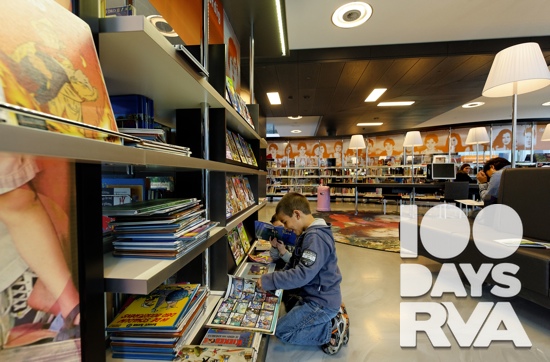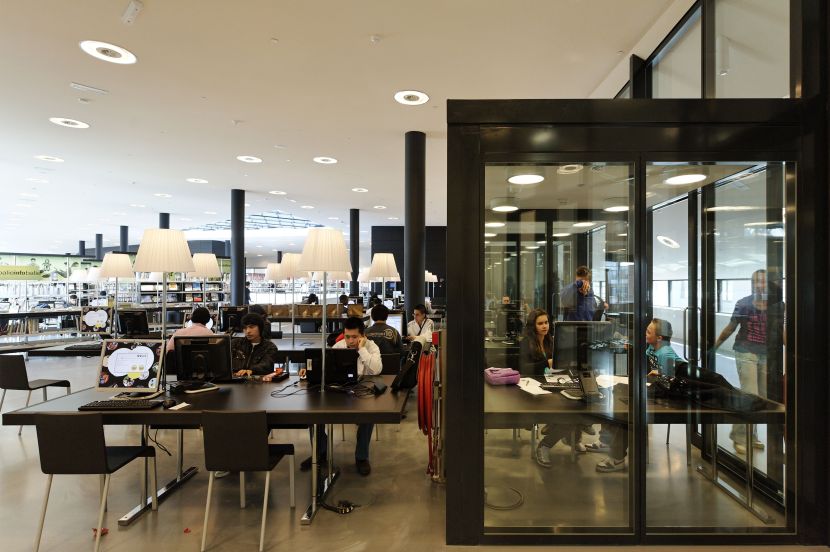Day #072: Progressive libraries
Progressive and library usually don’t go together, but libraries create unique opportunities for everyone to come together that are too important to ignore.

Inspired by Michael Bierut’s 100 Day Project, 100 Days to a Better RVA strives to introduce and investigate unique ideas to improving the city of Richmond. View the entire project here and the intro here.
- Idea: Experiment with environments, digital co-working options, and new services at the Richmond Public Libraries.
- Difficulty: 1 — These projects aren’t about money. They are about fostering a stronger community and different environment.
Public libraries are amazing. For the price of the occasional late fee, anyone can check out an incredible range of materials, have a place to work, and be a part of a community. Richmond public libraries do a great job with resources while sometimes unfairly being burdened with the task of fixing broader social issues than should ever be mandated of a library.
Nine branches offer a wide range of events for free while maintaining a law library and keeping the city’s archives. This is not an accomplishment that should be overlooked, but it also isn’t a reason to stop exploring. RPL should experiment with environments, digital co-working options, and new services while strengthening their community and furthering their mission.
With so many locations, it would be interesting to experiment with different environments at the library. Richmond’s Coffitivity has racked up awards for its creativity inspiring ambient noise app. Maybe some zones at the library should forgo the shushing librarian.

That’s what the denieuwebibliotheek (video) on the Stadhuisplein in Almere, a planned town on the outskirts of Amsterdam, has done for the past five years. Upper stories are still reserved for quiet study, but lower floors and the atrium are awash in soothing sounds that cancel each other out. A piano that is open to the public sits immediately inside the front door of its main branch.
Director of communications for the library, Marga Kleinenberg doesn’t mince words when she talks about the library’s mission. “We feel that shushing librarians are killing our image. Make patrons feel at ease and regularly treat them to something new/else–in our view that is the way to persuade them to keep coming.”
The creativity doesn’t stop at ambiance. denieuwebibliotheek also belongs to Seats2Meet. The website brings “knowmads” together in sort of popup co-working spaces.
If the prices at a space like Gather RVA are any indication, there is significant demand for workspace. Creating a limited environment for affordable spots that capitalizes on any of the libraries surplus capacity could help aspiring businesses take their first steps.
In a city deeply concerned with fighting poverty and creating jobs, a well executed streamlined program could be the launchpad for creating a business. This environment could also bring entrepreneurs and social capital together. The opportunities and network effects are obvious, and they could be a public good offered by the library.
I’m sensitive to not over-expanding the mission of the library and protecting regular users, but this could be an interesting opportunity to bring people together in unprecedented ways.
Finally, Friends of the Library is doing a great job augmenting the library’s funding with a book sale and donations, but it may be interesting to create a fee system with expanded services.
Richmond has 107,000 active library cards. That’s over 50% of residents. 32% of residents in Almere are dues paying members of the library.
No one should ever be turned away from library. Ever. But any profitable function the library can offer to cross-subsidize the expansion of other services is at least worth entertaining. I know individuals who would subscribe for practice room access in a basement. After-hours meetings spaces are another option. Libraries have huge fixed capital costs and unbelievable assets that can be monetized while expanding services.
Public libraries are a unique opportunity to bring everyone together in pure pursuits. Recently built on reclaimed land, Almere decided to center their culture around the library, and it is clearly paying dividends. Richmond Public Libraries don’t need a revolution, but denieuwebibliotheek is fodder for ideas as to how to take the next step.
At the very least, their librarians talk unlike any other librarians in the world: “The reason for these diverse service is to prolong the visits of our patrons. One doesn’t have to leave the building because a lot can be done here. You don’t want to leave this building because it’s fun here. So, the longer patrons stay here, the more they see and the more they borrow.”

Love this idea? Think it’s terrible? Have one that’s ten times better? Head over to the 100 Days to a Better RVA Facebook page and join in the conversation.
-
Recommend this
on Facebook -

Report an error
-

Subscribe to our
Weekly Digest





Notice: Comments that are not conducive to an interesting and thoughtful conversation may be removed at the editor’s discretion.
This premise assumes Richmond public libraries have unused space just waiting to be occupied by new services. I am a former public library director, and I can testify that the majority of today’s public libraries are already utilizing all available space for essential services. And, most public libraries already provide meeting room space after hours. The assumption that U.S. librarians are not progressive is completely false.
But if ALL US Libraries are “progressive”, are they really still “progressive”?
I think the ideas have to be viewed in a bigger picture. Ultimately, there is surplus capacity if you look at space*time. For example, the library could open on Sunday or after hours to rent out space for rehearsals and practice while making a profit that could be used to cross-subsidize expanding essential services. The wages would ultimately be low compared to the product because of the surplus capacity of the space.
I’m not saying this is what should be done. I’m more curious as to why this isn’t even discussed or experimented.
I don’t think I’ve seen a shushing librarian since I was in the fourth grade (I’m 38 now, so that was a while ago). It makes me uneasy to hear talk about instituting tiers of service in a public library. Fee-based services just seem like one more way to create barriers to access (both resources and people). However, I’m bringing a librarian’s perspective to the suggestion of charging for top tiers of service, and the librarian is just one of many stakeholders. How might we find a way to pay for innovative library services and programming? There are solutions out there. It’s just a matter of bringing the right people to the table to talk.
It’s possible that those dialogues are starting to take place. I was excited to see on Facebook this morning that Floricane is working with the Richmond Public Library Foundation (the Floricane folks also posted a link to an Atlantic Monthly article called “Not Your Mother’s Library: How Columbus, OH Is Building Community Spaces for the 21st Century”).
I think there are great things in store for the Richmond Public Library.